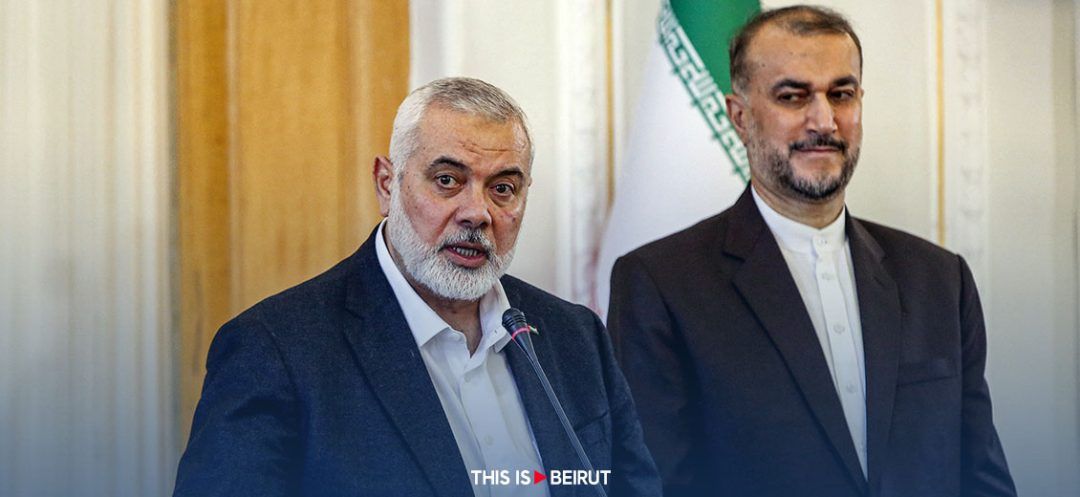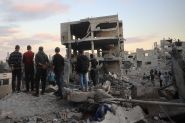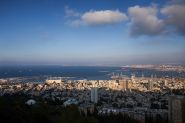- Home
- War in the Middle East
- In Tehran, Hamas Leader Haniyeh Hails Israel's 'Political Isolation’

©(AFP)
Hamas leader Ismail Haniyeh hailed Israel's "unprecedented political isolation" during a visit to Iran on Tuesday, the second since the start of the war.
Hamas leader Ismail Haniyeh, on a visit to Iran on Tuesday, said Israel is experiencing "unprecedented political isolation," a day after the UN Security Council called for a ceasefire in the Gaza war.
"Although this resolution came late and there may be some gaps that need to be filled, the resolution itself indicates that the Israeli occupation is experiencing unprecedented political isolation," Haniyeh told a news conference in Tehran.
He added that Israel is "losing political cover and protection even in the Security Council" and "the US is unable to impose its will on the international community."
Haniyeh was accompanied by Iranian Foreign Minister Hossein Amir-Abdollahian, who made no comment during the press conference.
Haniyeh arrived in Tehran earlier on Tuesday and met with Amir-Abdollahian. He is scheduled to meet other senior officials during his visit, Iran's state news agency, IRNA, said.
It is the second visit the Hamas leader has made to Tehran since the Iran-backed group launched an unprecedented attack on Israel on October 7, which resulted in the deaths of some 1,160 people, mostly civilians, according to an AFP tally of Israeli official figures.
Haniyeh's last visit was in early November, when he met with Iran's supreme leader, Ayatollah Ali Khamenei, as well as other officials.
Iran hailed the October 7 attack as a "success" but denied any direct involvement.
Iran-backed groups in Iraq, Lebanon, Syria, and Yemen have since carried out a flurry of attacks on Israeli and Western targets.
Israel's retaliatory campaign against Hamas has killed more than 32,000 people in Gaza, most of them women and children, according to the local health ministry.
Haniyeh's visit comes after a resolution adopted by the UN Security Council on Monday called for an "immediate ceasefire" for the ongoing Muslim holy month of Ramadan, leading to a "lasting" truce.
It also demanded that Hamas and other Palestinian militant groups release the hostages they took during the October 7 attack.
Militants seized about 250 hostages, of whom Israel believes some 130 are still held in Gaza, including 33 presumed dead.
Iranian foreign ministry spokesman Nasser Kanani described Monday's resolution as a "positive but insufficient step." He called for "effective measures to implement the resolution and the complete and permanent cessation of attacks."
With AFP
Hamas leader Ismail Haniyeh, on a visit to Iran on Tuesday, said Israel is experiencing "unprecedented political isolation," a day after the UN Security Council called for a ceasefire in the Gaza war.
"Although this resolution came late and there may be some gaps that need to be filled, the resolution itself indicates that the Israeli occupation is experiencing unprecedented political isolation," Haniyeh told a news conference in Tehran.
He added that Israel is "losing political cover and protection even in the Security Council" and "the US is unable to impose its will on the international community."
Haniyeh was accompanied by Iranian Foreign Minister Hossein Amir-Abdollahian, who made no comment during the press conference.
Haniyeh arrived in Tehran earlier on Tuesday and met with Amir-Abdollahian. He is scheduled to meet other senior officials during his visit, Iran's state news agency, IRNA, said.
It is the second visit the Hamas leader has made to Tehran since the Iran-backed group launched an unprecedented attack on Israel on October 7, which resulted in the deaths of some 1,160 people, mostly civilians, according to an AFP tally of Israeli official figures.
Haniyeh's last visit was in early November, when he met with Iran's supreme leader, Ayatollah Ali Khamenei, as well as other officials.
Iran hailed the October 7 attack as a "success" but denied any direct involvement.
Iran-backed groups in Iraq, Lebanon, Syria, and Yemen have since carried out a flurry of attacks on Israeli and Western targets.
Israel's retaliatory campaign against Hamas has killed more than 32,000 people in Gaza, most of them women and children, according to the local health ministry.
Haniyeh's visit comes after a resolution adopted by the UN Security Council on Monday called for an "immediate ceasefire" for the ongoing Muslim holy month of Ramadan, leading to a "lasting" truce.
It also demanded that Hamas and other Palestinian militant groups release the hostages they took during the October 7 attack.
Militants seized about 250 hostages, of whom Israel believes some 130 are still held in Gaza, including 33 presumed dead.
Iranian foreign ministry spokesman Nasser Kanani described Monday's resolution as a "positive but insufficient step." He called for "effective measures to implement the resolution and the complete and permanent cessation of attacks."
With AFP
Read more



Comments